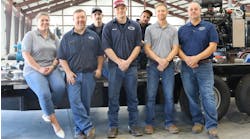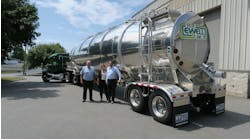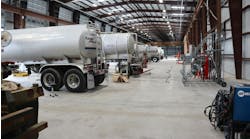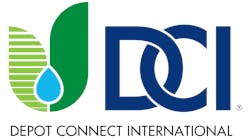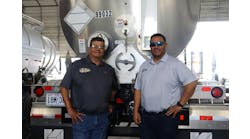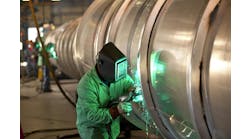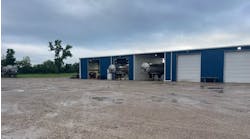Route 66 Truck & Trailer makes a specialty of MC330/331 pressure vessel refurbishment
FARMERS Oil Company Inc sets high expectations for its fleet maintenance program. To meet those objectives, the tank truck carrier handles a majority of the fleet maintenance in-house.
The carrier’s 115 tractors are serviced at terminal shops in Anthony and Valley Center, Kansas, and Afton, Oklahoma. Mechanics at the three shops also handle routine maintenance for the company’s 220 trailers.
The Afton shop is much more than a general fleet maintenance location, though. Operating under the name Route 66 Truck & Trailer, the Afton shop is a registered commercial cargo tank repair facility that specializes in code repairs for the MC330/331 pressure vessels that account for 150 of the trailers in the Farmers Oil fleet.
“We opened Route 66 Truck & Trailer as a division of Farmers Oil in 2011,” says Larry Graves, president of Farmers Oil and Route 66 Truck & Trailer. “I had always wanted a repair facility specializing in MC331 pressure vessels because we were spending $300,000 to $400,000 a year on our own MC331 trailers. It was the five-year test that really pushed us to build our own dedicated MC331 shop. It takes a lot of time and effort to do that inspection properly.
“We designed and built the Afton shop as a commercial facility that is open to other companies operating MC330/331 pressure vessels. We serve primarily serve the Midwest, and most of our customers are from Oklahoma, Kansas, Nebraska, Iowa, Illinois, and Texas.”
Largest shop
With 10 maintenance bays (four for trucks and six for trailers) and 18 technicians, the Afton shop is the largest in the Farmers Oil system. The four-bay Anthony shop has two mechanics, and the six-bay Valley Center shop employs three mechanics.
While all three shops provide routine vehicle service, the Afton crew handles new truck in-service work, glider-kit assembly, and tank inspection, testing, and refurbishment of MC330/331 pressure vessels. To handle the tank inspections and tests, Route 66 Truck & Trailer has two certified cargo tank inspectors on staff and another will be added in October. A registered inspector is on retainer. ASME code welders also are on the staff.
On average, there are at least 10 to 15 MC330/331 pressure vessels undergoing testing and overhaul during the course of a month at Route 66 Truck & Trailer. “We’re even busier during the summer, because that is downtime for most MC330/331 trailers,” Graves says.
The amount of overall and refurbishment typically is dictated by the results of the five-year test and inspection that is required under the federal cargo tank rules for MC330/331 pressure vessels.
“Propane trailers work hardest in the winter when road conditions are at their worst and salt and various chemicals are used to treat ice and snow,” Graves says. “The operating conditions in many parts of the country take a toll on these trailers.
“We see corrosion damage—some of it severe--to under carriages and upper coupler assemblies on many propane trailers. That is in addition to the wear and tear that occurs over the course of five years.”
Visual inspection
Following degassing of an MC330/331 pressure vessel—which takes about 24 hours--trailer technicians perform a thorough visual examination of the tank inside and out. “We look for and document corrosion inside and outside the tank,” says Jeremey Graves, general manager of Farmers Oil. “Corrosion inside a pressure vessel is not uncommon.”
Hydrostatic testing also is part of the five-year process, and technicians are able to use a city water hydrant in front of the shop. Usually two trailers at a time are hydrostatically tested. The shop also has the capability for wet suspension magnetic particle testing, which is used to find discontinuities (imperfections) below the surface of the vessel.
Once the testing is done, mechanics begin fixing whatever problems have turned up. Generally, two welders work on each MC330/331 trailer overhaul.
“We have very skilled welders on our team,” says Julie Martin, quality control at Farmers Oil. “What they do is almost an art form. Some of the welders were here even before we opened Route 66 Truck & Trailer.”
Tank repairs
Typical repairs include fixing or replacing internal tank baffles, upper coupler assemblies, and subframes for the running gear. Internal and external valve leaks are common.
“Our mechanics find a lot of internal baffles with broken welds or bolts that have worn through the mounting brackets,” Jeremey Graves says. “We see upper coupler assemblies that are badly rusted and the same goes for running gear subframes. I believe the upper coupler assembly should be inspected annually.
“We replace or rebuild most of the pressure-relief vents and product valves, and we repeat the leak test for the new components. There is always a possibility that a new valve right out of the box will leak. We can’t take any chances.
“We also replace running gear hardware. On our own trailers, that includes brake components and suspension air bags.”
Most of the repair and renovation work is performed in-house. Heat treatment and sandblasting are among the only processes sent to outside contractors.
Parts fabrication
Code welders on staff handle any repairs to the pressure vessel itself, while other trailer shop technicians fabricate replacement parts, including the upper coupler assembly and trailer suspension frame. Upper coupler plates come from a parts supplier.
Fabrication shop equipment includes a Scotchman metalworker and Miller MIG and TIG welding machines. The shop also has a Lite-Check 920 for checking the trailer electrical system and nitrogen used for inert atmospheres in trailers and for tire inflation.
Once testing and repairs are complete, the trailer is readied for the paint shop. For a Farmers Oil MC330/331 trailer, this could means a premium paint job with PPG Del Fleet, a high-solid polyurethane coating.
Larry Graves says he believes the key to maintaining an MC330/331 trailer is to keep it painted, to keep the rust off. “That is why we repaint our propane and anhydrous ammonia trailers from the top down every 10 years,” he says. “We do it more often for trailers operating in harsher winter conditions.”
Premium paint
A premium paint job at Route 66 Truck & Trailer starts with sandblasting the trailer exterior down to bare metal. Technicians in the paint shop prep bay perform any additional body work to endure a smooth exterior.
Once all of the prep is complete, the trailer is moved to the 84-ft paint booth. The process starts with three to four coats of primer, which are sanded flat. The trailer is washed. Then come two coats of the PPG premium polyurethane paint. All of the trailer hardware is painted, including product pump and valves. The full process takes 160 hours over the course of about seven days.
The paint shop also handles the custom paint jobs on the company tractors in the Farmers Oil fleet. Each tractor paint job is a precision project done by hand.
“Details matter to us,” Larry Graves says. “We want a quality appearance for our fleet, and we do the same on trailers we refurbish for other customers.”
